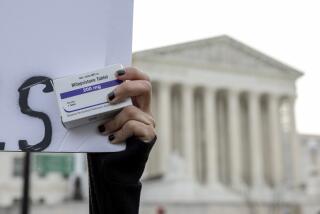FDA’s Approval and Delay in Withdrawing Rezulin Probed
- Share via
WASHINGTON — Federal prosecutors are examining aspects of the government’s rapid approval and delayed withdrawal of Rezulin, the blockbuster diabetes drug linked to 63 liver-failure deaths.
According to people familiar with the matter, several Food and Drug Administration officials have been questioned in the last month by prosecutors assigned to the office of the U.S. attorney in Greenbelt, Md.
The prosecutors are exploring the conduct of both the manufacturer of Rezulin and FDA administrators, according to witnesses. After a $90-billion merger in June, operations of the pill’s manufacturer, Warner-Lambert Co., have been assumed by a rival pharmaceutical firm, Pfizer Inc.
Witnesses have been asked about representations concerning liver toxicity that Warner-Lambert made to the FDA while winning approval for Rezulin and opposing its withdrawal. The FDA granted “fast-track” approval to Rezulin in January 1997. Citing safety concerns, the FDA on March 21 of this year announced that Warner-Lambert would withdraw it.
Two of the prosecutors who have participated in the questioning are Assistant U.S. Attys. Gina L. Simms and Barbara S. Skalla. The interviews also have been attended by agents Michael Cummins and Mark Supple of the FDA’s Office of Criminal Investigations.
The questions follow disclosures made by The Times since December 1998 about the dangers of Rezulin, conflicts of interest and the actions of Warner-Lambert and the FDA.
Among witnesses questioned by prosecutors are Dr. David J. Graham, an FDA epidemiologist, and Lanh Green, an agency pharmacist. With Green’s assistance, Graham publicly presented a detailed analysis of Rezulin in March 1999, estimating that the drug had been linked to more than 400 liver failures. (Experts believe that only 1% to 10% of adverse-drug reactions are reported to the FDA.)
Graham at that time depicted Rezulin as one of the most dangerous pills on the American market. He concluded that--contrary to repeated assurances from Warner-Lambert and FDA pronouncements--no reliable means existed to shield patients taking the drug from liver failure.
Senior FDA officials, however, sided with Warner-Lambert executives, who contended that the drug was safe and should not be withdrawn. As recently as the day the withdrawal was announced, one of those FDA officials, deputy drug center director Murray M. “Mac” Lumpkin, argued against banning Rezulin.
Prosecutors also have scheduled an interview with Dr. John L. Gueriguian, the former FDA medical officer who first opposed Rezulin. In the fall of 1996, he warned of Rezulin’s potential to harm the liver and the heart and recommended that the FDA reject the pill.
In three years on the market, Rezulin generated sales topping $2.1 billion for Warner-Lambert.
Laura Bradbard, a spokeswoman for the FDA, said that agency policy prohibited her from commenting on an ongoing investigation. A spokeswoman for Pfizer, the successor to Warner-Lambert, said that the company is “not aware of a basis for any investigation.”
The questioning conducted recently by federal prosecutors is in addition to earlier inquiries made by the FDA’s Office of Criminal Investigations. Agents in March began investigating the circumstances surrounding Warner-Lambert’s handling of severe liver toxicity detected during a 1994 clinical trial of Rezulin.
Deborah Johnston, an assistant U.S. attorney who supervises the work of prosecutors in Greenbelt, referred all questions to her superior in Baltimore. That official did not return calls placed to his office.
Dr. Richard C. Eastman, subject of an earlier investigation related to Rezulin, resigned in June from the National Institutes of Health, where he was the government’s top diabetes researcher. Eastman’s resignation came as the inspector general of the Department of Health and Human Services concluded an investigation of his acceptance of $78,455 in compensation from Warner-Lambert while overseeing a $150-million government study of Rezulin.
Officials said Eastman, who in 1995 and 1996 signed separate recusals pledging not to participate in decisions affecting Rezulin’s status in the NIH study, would not be penalized.
Eastman had noted that his consulting arrangement with Warner-Lambert
was approved by his superiors at NIH.
More to Read
Sign up for Essential California
The most important California stories and recommendations in your inbox every morning.
You may occasionally receive promotional content from the Los Angeles Times.














